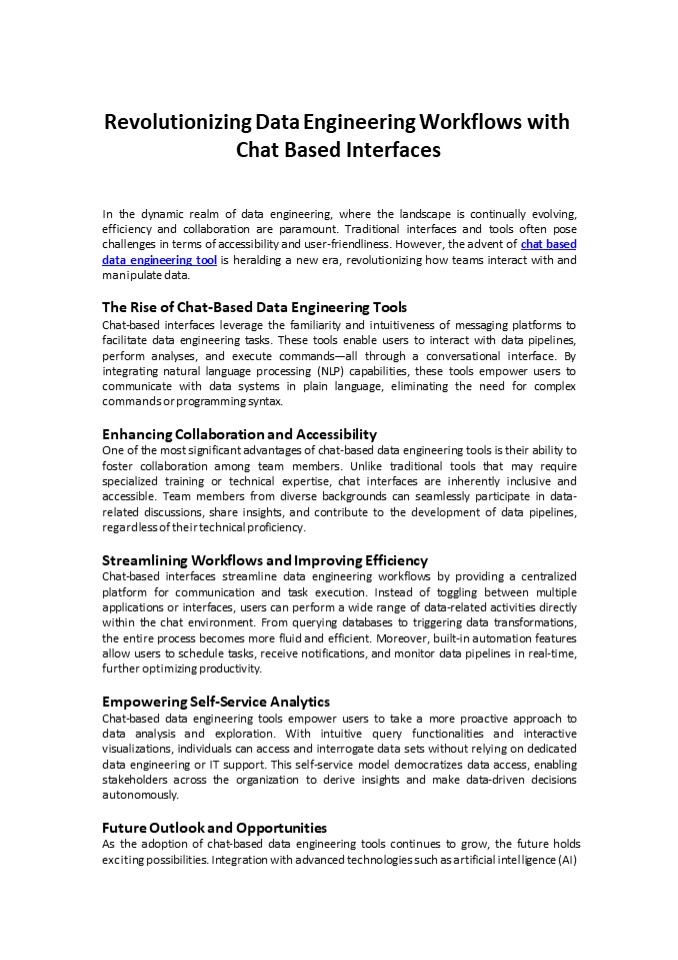Revolutionizing Data Engineering Workflows with Chat Based Interfaces - PowerPoint PPT Presentation
Title:
Revolutionizing Data Engineering Workflows with Chat Based Interfaces
Description:
Chat based interfaces like Ask On Data are reshaping the landscape of data engineering by prioritizing accessibility, collaboration, and efficiency. By leveraging the familiar format of messaging platforms, these tools bridge the gap between users and data systems, empowering individuals across the organization to harness the power of data effectively. As organizations embrace the transformative potential of chat-based data engineering tools, they will undoubtedly unlock new opportunities for growth, innovation, and competitive advantage in an increasingly data-driven world. – PowerPoint PPT presentation
Number of Views:0
Title: Revolutionizing Data Engineering Workflows with Chat Based Interfaces
1
Revolutionizing Data Engineering Workflows with
Chat Based Interfaces
In the dynamic realm of data engineering, where
the landscape is continually evolving, efficiency
and collaboration are paramount. Traditional
interfaces and tools often pose challenges in
terms of accessibility and user-friendliness.
However, the advent of chat based data
engineering tool is heralding a new era,
revolutionizing how teams interact with and
manipulate data. The Rise of Chat-Based Data
Engineering Tools Chat-based interfaces leverage
the familiarity and intuitiveness of messaging
platforms to facilitate data engineering tasks.
These tools enable users to interact with data
pipelines, perform analyses, and execute
commandsall through a conversational interface.
By integrating natural language processing (NLP)
capabilities, these tools empower users to
communicate with data systems in plain language,
eliminating the need for complex commands or
programming syntax. Enhancing Collaboration and
Accessibility One of the most significant
advantages of chat-based data engineering tools
is their ability to foster collaboration among
team members. Unlike traditional tools that may
require specialized training or technical
expertise, chat interfaces are inherently
inclusive and accessible. Team members from
diverse backgrounds can seamlessly participate in
data- related discussions, share insights, and
contribute to the development of data pipelines,
regardless of their technical proficiency. Streaml
ining Workflows and Improving Efficiency Chat-base
d interfaces streamline data engineering
workflows by providing a centralized platform for
communication and task execution. Instead of
toggling between multiple applications or
interfaces, users can perform a wide range of
data-related activities directly within the chat
environment. From querying databases to
triggering data transformations, the entire
process becomes more fluid and efficient.
Moreover, built-in automation features allow
users to schedule tasks, receive notifications,
and monitor data pipelines in real-time, further
optimizing productivity. Empowering Self-Service
Analytics Chat-based data engineering tools
empower users to take a more proactive approach
to data analysis and exploration. With
intuitive query functionalities and
interactive visualizations, individuals can
access and interrogate data sets without relying
on dedicated data engineering or IT support. This
self-service model democratizes data access,
enabling stakeholders across the organization to
derive insights and make data-driven decisions
autonomously. Future Outlook and Opportunities As
the adoption of chat-based data engineering tools
continues to grow, the future holds exciting
possibilities. Integration with advanced
technologies such as artificial intelligence (AI)
2
and machine learning (ML) promises to further
enhance the capabilities of these tools. From
intelligent data suggestions to automated anomaly
detection, AI-powered features will empower users
to extract deeper insights and drive innovation
in data engineering workflows. Conclusion Chat
based interfaces like Ask On Data are reshaping
the landscape of data engineering by prioritizing
accessibility, collaboration, and efficiency. By
leveraging the familiar format of messaging
platforms, these tools bridge the gap between
users and data systems, empowering individuals
across the organization to harness the power of
data effectively. As organizations embrace the
transformative potential of chat-based data
engineering tools, they will undoubtedly unlock
new opportunities for growth, innovation, and
competitive advantage in an increasingly
data-driven world.































